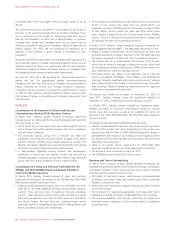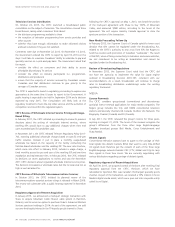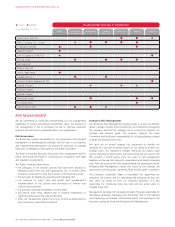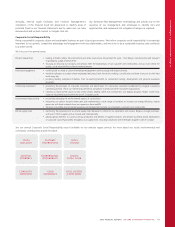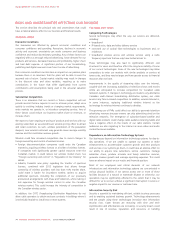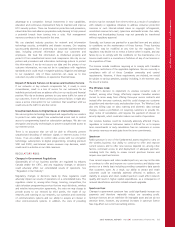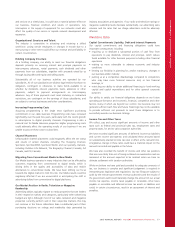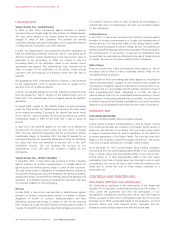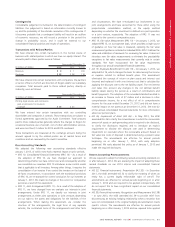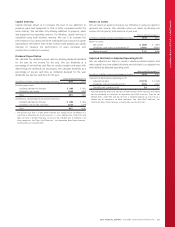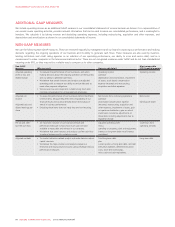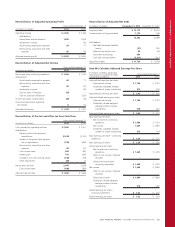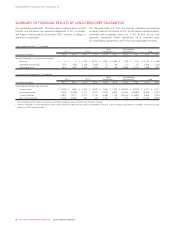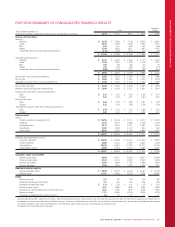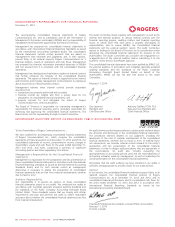Rogers 2013 Annual Report Download - page 82
Download and view the complete annual report
Please find page 82 of the 2013 Rogers annual report below. You can navigate through the pages in the report by either clicking on the pages listed below, or by using the keyword search tool below to find specific information within the annual report.MANAGEMENT’S DISCUSSION AND ANALYSIS
LITIGATION RISKS
System Access Fee – Saskatchewan
In 2004, a class action commenced against providers of wireless
communications in Canada under the Class Actions Act (Saskatchewan).
The class action related to the system access fee wireless carriers
charged to some of their customers. The plaintiffs are seeking
unspecified damages and punitive damages, which would effectively be
a reimbursement of all system access fees collected.
In 2007, the Saskatchewan Court granted the plaintiffs’ application to
have the proceeding certified as a national, “opt-in” class action where
affected customers outside Saskatchewan must take specific steps to
participate in the proceeding. In 2008, our motion to stay the
proceeding based on the arbitration clause in our wireless service
agreements was granted. The Saskatchewan Court directed that its
order, in respect of the certification of the action, would exclude
customers who are bound by an arbitration clause from the class of
plaintiffs.
We appealed the 2007 certification decision, however, it was dismissed
by the Saskatchewan Court of Appeal and leave to appeal to the
Supreme Court of Canada was denied.
In 2012, the plaintiffs applied for an order seeking to extend the time
they can appeal the “opt-in” decision of the Saskatchewan Court. In
March 2013, the Saskatchewan Court of Appeal denied the plaintiffs’
application.
In August 2009, counsel for the plaintiffs began a second proceeding
under the Class Actions Act (Saskatchewan) asserting the same claims
as the original proceeding. If successful, this second class action would
be an “opt-out” class proceeding. This second proceeding was ordered
conditionally stayed in 2009 on the basis that it was an abuse of
process.
In April 2013, the plaintiffs applied for an order to be allowed to
proceed with the second system access fee class action. In August
2013, the court denied this application and the second action remains
conditionally stayed. In December 2013 the plaintiff applied for an
order permitting them to amend the Statement of Claim to reintroduce
the claims they were not permitted to proceed with in the 2007
certification decision. We are awaiting the decision of the
Saskatchewan Court. We have not recorded a liability for this
contingency.
System Access Fee – British Columbia
In December 2011, a class action was launched in British Columbia
against providers of wireless communications in Canada about the
system access fee wireless carriers charge to some of their customers.
The class action relates to allegations of misrepresentations contrary to
the Business Practices and Consumer Protection Act (British Columbia),
among other things. The plaintiffs are seeking unspecified damages and
restitution. A certification hearing is scheduled for April 2014. We have
not recorded a liability for this contingency.
911 Fee
In June 2008, a class action was launched in Saskatchewan against
providers of wireless communications services in Canada. It involves
allegations of breach of contract, misrepresentation and false
advertising, among other things, in relation to the 911 fee that had
been charged by us and the other wireless communication providers in
Canada. The plaintiffs are seeking unspecified damages and restitution.
The plaintiffs intend to seek an order certifying the proceeding as a
national class action in Saskatchewan. We have not recorded a liability
for this contingency.
Cellular Devices
In July 2013, a class action was launched in British Columbia against
providers of wireless communications in Canada and manufacturers of
wireless devices. The class action relates to the alleged adverse health
effects incurred by long-term users of cellular devices. The plaintiffs are
seeking unspecified damages and punitive damages, effectively equal to
the reimbursement of the portion of revenues the defendants have
received that can reasonably be attributed to the sale of cellular phones
in Canada. We have not recorded a liability for this contingency.
Other Claims
There are certain other claims and potential claims against us. We do
not expect any of these to have a materially adverse effect on our
consolidated financial position.
The outcome of all the proceedings and claims against us, including the
matters described above, is subject to future resolution that includes the
uncertainties of litigation. Based on information currently known to us,
we believe that it is not probable that the ultimate resolution of any of
these proceedings and claims, individually or in total, will have a
material adverse effect on our consolidated financial position or results
of operations. If it becomes probable that we are liable, we will record a
provision in the period the change in probability occurs and it would be
material to our consolidated financial position and results of operations.
OWNERSHIP RISK
Controlling Shareholder
Rogers is a family-founded, family-controlled company.
Voting control of Rogers Communications is held by Rogers Control
Trust whose beneficiaries are members of the Rogers family, several of
whom are also directors of our Board. The trust holds voting control
of Rogers Communications Inc. and its subsidiaries for the benefit of
successive generations of the Rogers family. The trust also deals with
Rogers on the company’s long-term strategy and direction. The trustee
is the trust company subsidiary of a Canadian chartered bank.
As of December 31, 2013, private Rogers family holding companies
controlled by the trust owned approximately 90.9%of our outstanding
Class A Voting shares and approximately 9.8%of our Class B Non-
Voting shares, or in total approximately 28%of the total shares
outstanding. Only Class A Voting shares carry the right to vote in most
circumstances. As a result, the trust is able to elect all members of our
Board and to control the vote on most matters submitted to a
shareholder vote.
CONTROLS AND PROCEDURES
DISCLOSURE CONTROLS AND PROCEDURES
We conducted an evaluation of the effectiveness of the design and
operation of our disclosure controls and procedures as of December 31,
2013, under the supervision and with the participation of our
management, including the Chief Executive Officer and Chief Financial
Officer, pursuant to Rule 13a-15 promulgated under the US Securities
Exchange Act of 1934, as amended. Based on this evaluation, our Chief
Executive Officer and Chief Financial Officer concluded that our
disclosure controls and procedures were effective at that date.
78 ROGERS COMMUNICATIONS INC. 2013 ANNUAL REPORT


